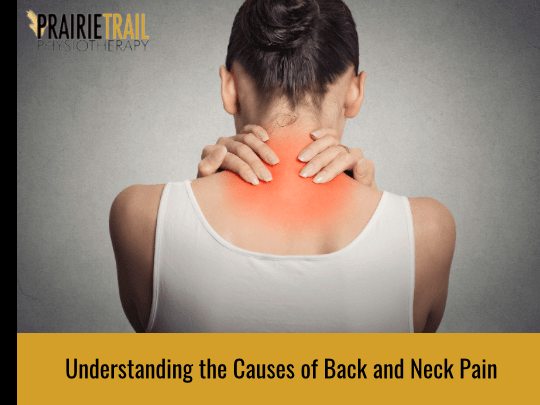Talk about a pain in the neck – literally! Neck and back pain are common complaints. About 60% to 80% of adults will experience back pain, and 20% to 70% will experience neck pain in their lifetimes. Pain can range from a mild, annoying ache to persistent, disabling pain. Back and neck pain can be considered acute (meaning it comes on suddenly and intensely) or chronic (lasting for weeks, months, or more). Your pain might be intermittent, coming and going, or continuous. Unfortunately, back and neck pain can affect your quality of life, and you should always consult your healthcare provider if the pain interferes with your daily activities.
What are some causes of back and neck pain?
Muscle and/or Joint Injury
A common cause of back or neck pain is a muscle and/or joint injury, where the tissues stretch too far and potentially tear. Sprains and strains from physical activity such as sports or overuse can cause stiffness and soreness. Car accidents, trips, or falls can cause torn ligaments or muscles in the spine, causing severe pain. Major vertebral injuries involving the spinal cord can cause paralysis and require immediate medical care, although these are extremely rare.
Prolonged Posture and Stress
Do you work a desk job where you sit for hours at a time? Is your job causing you stress? Sitting or standing for extended periods of time without moving can cause your muscles and joints to feel stiff and tight. This feeling can also be exacerbated by the stresses of your workday. Although not damaging to your spine, these sensations can cause pain, weakness and disability, putting your body at higher risk for injury in the future, forcing you to miss out on the things you enjoy doing.
Disc Herniation
Sometimes causing a pinched nerve, disc herniation is a common cause of back and neck pain. Between the small bones of the spine (vertebrae) are discs, parts that absorb shock and give the spine its motion and mobility. These discs are very robust structures but can sometimes get injured. With disc herniations, a crack in the hard outside can cause the softer liquid inside to leak, causing pain, weakness, and numbness. A disc herniation can be caused by degeneration as we age but can also be caused by injury or trauma.
Diseases or Conditions
Certain conditions can lead to pain in the neck or back, such as
- Osteoporosis – a bone disease that develops when bone mineral density and bone mass decrease or when the structure and strength of bone change
- Arthritis – inflammatory arthritis of the spine, such as ankylosing spondylitis
- Fibromyalgia – a chronic condition that causes muscle pain and tenderness throughout the body along with fatigue
- Scoliosis – a condition where the spine is abnormally curved
- Stenosis – a narrowing of the spinal canal
- Infection – such as spinal infections or bacterial meningitis
- Mental health conditions – can increase our sensations of pain
Whatever the reason, the back and neck are some of the most common problem areas physiotherapists see. At Prairie Trail Physiotherapy, we can provide a comprehensive assessment to identify the possible sources of your pain and discomfort while offering various services and exercises to treat the issue. No one needs pain getting in the way of living their best life. If you have questions or concerns, please get in touch with us right away.

